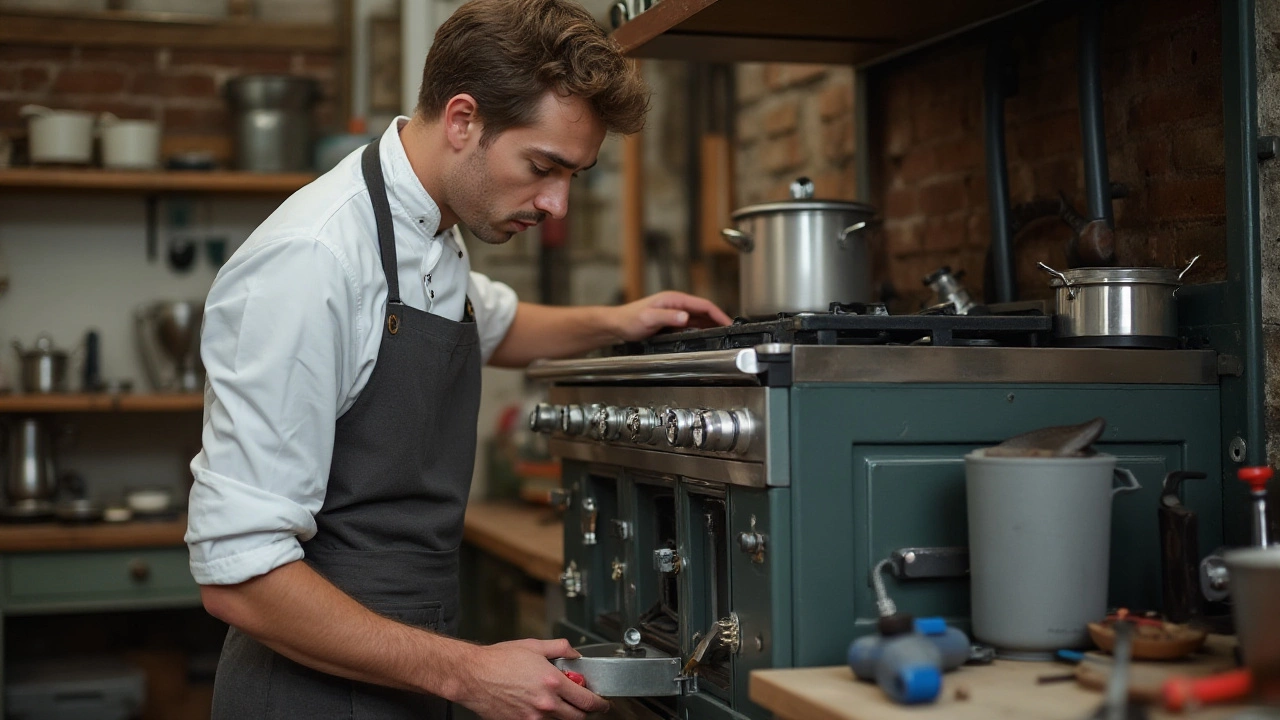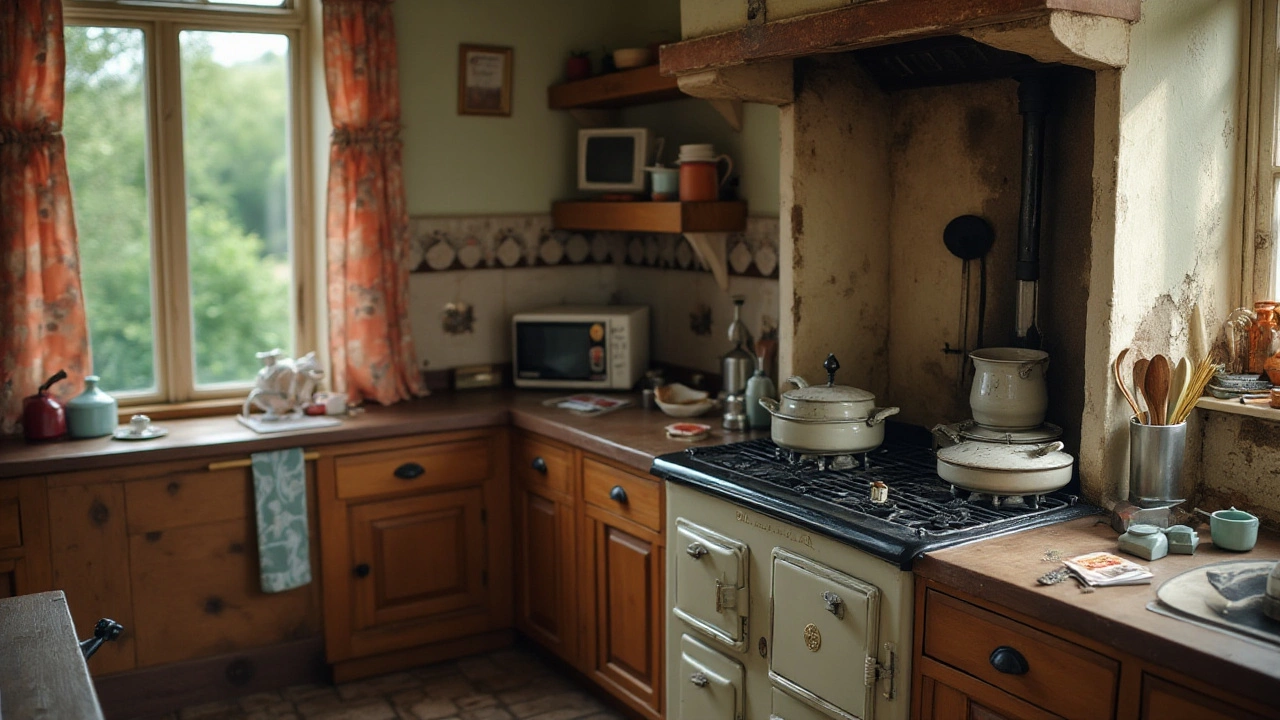Your cooker is a crucial player in your kitchen adventures, handling the heavy lifting for many culinary creations. But how long should you expect your trusty appliance to last before it starts giving up the ghost? Understanding its average lifespan and how to care for it can save you time and money.
As with any appliance, a cooker's longevity depends on several factors. How often it's used, the type you have, and even the frequency and quality of maintenance all play their parts. Let's dive into what affects the life of your cooker and how you can considerably extend that lifespan with a few simple practices.
- Factors Influencing Cooker Lifespan
- Signs Your Cooker Needs Attention
- Maintenance Tips to Extend Cooker Life
- When to Repair vs. Replace
- Knowing When to Call a Professional
Factors Influencing Cooker Lifespan
The lifespan of your trusty cooker isn't just a roll of the dice. Numerous factors come into play, determining how long it will faithfully serve your kitchen needs. Whether you've got your sights set on a sparkling gas range or an electric stunner, knowing these factors can be the key to unlocking years of dependable service. First off is usage frequency. Naturally, a cooker that's put through its culinary paces daily won't last as long as one only used for occasional weekend roasts. Regular use increases wear and tear, just like with any mechanical marvel. But fret not! With mindful attention to its care, even a heavily-used appliance can boast a robust lifespan.
Material and build quality are significant aspects too. Cookers made from durable materials and solid craftsmanship typically stand the test of time better than their flimsier counterparts. Think of those hardy stainless-steel models or cast-iron cooktops, known for their durability and resistance to wear. A good rule of thumb? The heavier the appliance, often the longer it’ll last. Another element is maintenance. Regular maintenance isn’t just recommended; it’s crucial. This means more than a simple wipe-down. It involves periodic checks for issues like gas leaks, faulty wiring, or accumulated grime that could lead to inefficiency or hazards. Establishing a routine with your cooker, just like you would with a pet or plant, ensures it ages gracefully.
"Regular maintenance not only prevents costly repairs but extends the life of your cooker," says appliance expert Jane Doe from Appliance Care.
Location plays a sneaky role too. Surprisingly, where your cooker resides in your kitchen can affect its lifespan. Placing it under direct sunlight or in a perpetually humid area can speed up deterioration. Make sure it’s stationed in a spot that shields it from extreme conditions. Additionally, voltage fluctuations are a silent saboteur of many electric cookers. Inconsistent electricity supply can lead to malfunctions or reduced efficiency. Investing in a reliable surge protector can save you from unexpected breakdowns.
Finally, the age of your appliance at the time of purchase matters. A brand-new cooker will naturally last longer than a second-hand model or one that's been sitting for years on a showroom floor. When buying, don’t shy away from asking about the manufacturing date. Newer models often incorporate technology that not only enhances functionality but extends life. Considering all these factors together gives any cookenthusiast a solid foundation to ensure their cooker stands the tests of time and use. Make informed choices, and your appliance will reward you with years of dependable service.
Signs Your Cooker Needs Attention
The humble cooker often goes unnoticed until something goes awry, yet it is vital that we are vigilant about the hints it offers to ensure it remains in top-notch working condition. Often, these appliances don't fail overnight, but if you've noticed that your lasagna isn't browning the way it used to, or that soup's taking a tad longer to simmer — these might be early indicators of wear and tear. A significant drop in performance efficiency is one of the primary signs, and getting to the cause sooner rather than later can make all the difference.
Noise is another tell-tale sign that your cooker might need some attention. Ideally, the only sound coming from your cooker should be the gentle hum of the burner or perhaps the ticking of an electric ignitor. Any unusual noises — like buzzing, grinding, or clicking — can indicate underlying issues. These sounds could be symptomatic of parts loosening, malfunctioning components, or electrical issues. Ignoring these could lead to bigger problems or even safety hazards. So, listen closely and investigate the origin of any surprising noises.
Inconsistent heating is something every user should look out for. If you're finding cold spots in the oven or uneven flames on the stovetop, it's time for a closer inspection. Consistency is key in cooking, and if your output isn’t what it used to be, the roots might lie in malfunctioning components or blocked ports. According to a reputable industry expert, "80% of cooker issues stem from neglecting regular maintenance,"
notes Jamie Faulkner, editor of Appliance Advisor.Keeping a periodic check can avoid these pitfalls altogether.
Moreover, a sudden spike in your electricity or gas bill could be indicative of inefficiencies in your appliance. A cooker working harder than it should to perform its basic functions might use extra resources, costing you more than you bargained for. If you notice this trend without significantly changing your usage pattern, it’s time to inspect your appliance or call in a professional to assess its condition. Regular checks and attention to detail help maintain a balance between good cooking and energy consumption.
Rounding off the list, physical wear and tear shouldn't be overlooked either. Look for damages on the knobs, hinges, and seals which might appear minor but could severely impact performance. These damages could compromise the efficiency of the appliance or even lead to more significant issues over time. Regularly inspecting these and addressing them promptly helps prolong the lifespan and reliability of your cooker. We should always remember: a stitch in time saves nine, particularly when it comes to our faithful kitchen companions.

Maintenance Tips to Extend Cooker Life
Caring for your cooker not only prolongs its life but also keeps your meals tasting just right. Regular maintenance is key, and it all starts with cleanliness. Build-up from spills and splatters can not only cause odors but may also affect how well your cooker operates. Make it a habit to wipe down surfaces after each use with a damp cloth. For a thorough clean, a monthly deep scrub with vinegar and baking soda can remove stubborn residue and prevent corrosion, giving your cooker a fresh start. Remember, the easier it is for heat to distribute evenly, the less strain on your appliance over time.
It's vital to inspect your kitchen appliance regularly. Keep an eye out for wear and tear in seals and hinges as these can impact efficiency. Over time, the rubber seals in ovens can deteriorate, leading to heat escaping and uneven cooking. A simple test with a strip of paper can determine if the seal is airtight. Insert the paper into the closed door, and if it slips out easily, it might be time for a replacement. Properly sealing doors not only saves energy but also ensures even cooking results.
Don’t underestimate the importance of your cooker's filters. For those with a vented cooker hood, regularly cleaning or replacing the filters is crucial. Grease and grime accumulated in the filters can pose a fire hazard if left unchecked. Every couple of months, soak metal filters in a solution of hot water and degreasing dish soap to keep them clear of any obstructions. Consider this part of your essential routine to ensure both the longevity and safety of your cooker.
Maintaining a cookbook for your cooker might sound odd, but keeping a record of any repairs or issues can be incredibly useful. Track when parts are serviced or replaced and note any recurring issues. This proactive approach to tracking your cooker's health can alert you to patterns that might signal an impending failure. As
John Smith, a renowned appliance expert, once noted, 'A stitch in time saves nine, and with regular checks, cookers can often exceed their expected lifespan.'Keep this in mind as you monitor your appliance's performance over time.
Pay attention to power and temperature settings—the quieter contributors to your cooker lifespan. Frequent high-temperature cooking can wear out components quicker than moderate settings. If you often use the max settings, explore whether moderate adjustments could get the job done just as effectively. Over time, easing the strain on heating elements through smarter use can translate into wonderful benefits, sparing you the expense and hassle of unnecessary premature repairs.
When to Repair vs. Replace
Deciding whether to repair or replace your trusty cooker can be a conundrum faced by many homeowners. The emotional attachment you feel towards a longstanding piece of kitchen equipment often complicates this process. However, after a hearty meal has been cooked for ten years or more, it might lose its efficiency—not unlike how we all sometimes falter in our twilight years. Understanding the balance between repair and replacement is key.
First, gauge the age of your cooker. Most models have a life expectancy of 10 to 15 years. If your appliance is nearing this age range, you might want to consider replacement. Repairing a very aged cooker sometimes costs more than investing in a new, energy-efficient model. Innovations in technology have made newer cookers not just more energy-efficient, but also packed with features that could make your cooking experience more delightful.
Consider the costs involved. An easy rule of thumb some people use is this: if a repair costs more than half the price of a new appliance, it's wise to replace it. Also, weigh in the frequency of issues. Persistent problems that crop up shortly after each fix might signal that your cooker is more

Knowing When to Call a Professional
There comes a time in every cooker's life when professional intervention becomes necessary. While many minor issues can be managed with a bit of DIY spirit and routine maintenance, certain problems signal that it's time to call in the experts. Recognizing these signs early can prevent more significant issues and potentially costly repairs down the line. One of the primary indicators is recurring problems. If you find yourself troubleshooting the same issue repeatedly, it might be a clue that a deeper malfunction is at play. Professionals can quickly identify underlying causes that might not be apparent at a glance.
Unusual noises such as banging, hissing, or consistent unexplained noises could hint at components like fans or motors on the fritz. These sounds often require skilled hands to diagnose and resolve effectively. Moreover, persistent temperature inconsistencies indicate that something's amiss with your cooker's thermostat or heating elements. This is crucial for maintaining optimal cooking conditions and preventing potential food safety issues.
"When in doubt about appliance repair, consult a certified technician to safeguard both appliance integrity and household safety," suggests the National Appliance Service Association.
If your cooker faces electrical issues, such as frequent tripping of circuit breakers or visible damage to wires, it's imperative for safety reasons to seek professional assistance immediately. Handling electrical components within a cooker can be hazardous and should always be left to those with proper training and tools. Additionally, if you own a gas cooker, any gas-related problems should be treated with urgency. Gas leaks, even those minor in nature, are dangerous and demand the immediate attention of a trained technician.
For those who may still be hesitant about calling in a pro, consider the potential long-term savings. Investing in professional repairs often extends the overall cooker lifespan and enhances efficiency, which might not be achievable through untrained attempts. Look at it as an investment rather than an expenditure. Alongside this, staying updated with the latest technologies and enhancements is another perk of consulting professionals. They often have insights into contemporary models that are energy-efficient and better suited for evolving culinary needs.
Lastly, if your appliance is still under warranty, attempting self-repair might void the coverage. Always check with the manufacturer’s recommendations or warranty terms before opening up your cooker. In many cases, professional repair services tied with warranty agreements provide the best solution, ensuring that your rights as a consumer are protected.
